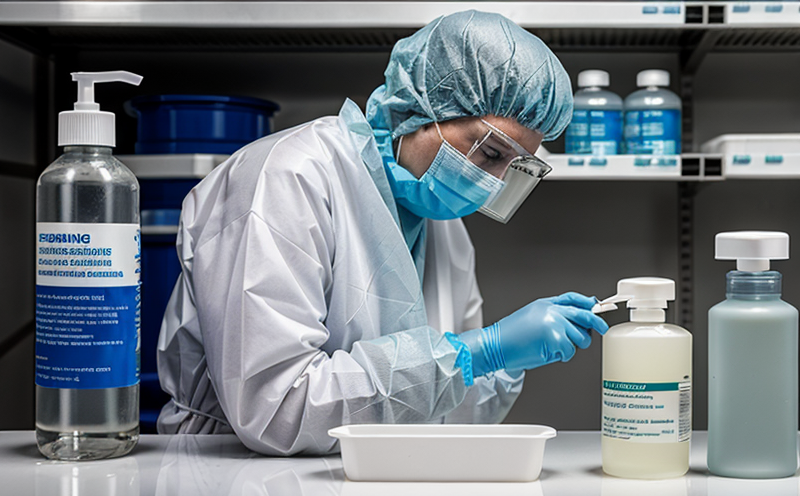ASTM D7968 Perfluorinated Compounds Test in Water
The ASTM D7968 standard provides a method for determining perfluorinated compounds (PFCs) in water. PFCs are synthetic chemicals, including perfluorooctanoic acid (PFOA), which have been widely used in the manufacturing of non-stick and waterproof products such as cookware and food packaging.
The importance of this test lies in its ability to detect trace levels of these compounds that can pose significant health risks. PFCs are persistent organic pollutants, meaning they do not break down easily in the environment or in living organisms. Once introduced into water systems, they can persist for a long time and bioaccumulate in aquatic life.
Given the increasing awareness about environmental pollution and human health impacts associated with these compounds, there is a growing demand for accurate testing methods to monitor their presence in water sources. The ASTM D7968 method enables laboratories like ours to provide reliable data that helps stakeholders make informed decisions regarding water quality management and policy.
The test involves several key steps. First, the sample water must be properly collected and preserved according to specified procedures outlined in the standard. This is crucial as improper handling can lead to contamination or degradation of the target analytes. Next, extraction techniques are employed to concentrate the PFCs from the aqueous phase into a suitable solvent. Common methods include solid-phase extraction (SPE) or liquid-liquid partitioning.
Following extraction, the concentrated sample is analyzed using advanced analytical instrumentation such as high-performance liquid chromatography coupled with tandem mass spectrometry (HPLC/MS/MS). This technique offers high sensitivity and selectivity necessary for detecting even minute amounts of PFCs. The instrument setup includes specific columns designed to retain PFCs during separation, ensuring accurate quantification.
After analysis, the results are interpreted based on established calibration curves generated from known standards containing varying concentrations of target compounds. Reporting is done according to ASTM D7968 guidelines which dictate how detection limits should be reported along with any relevant quality control metrics like spike recoveries and coefficients of variation.
| Applied Standards | Description |
|---|---|
| ASTM D7968-14(2021) | This standard specifies the procedure for determining perfluorinated compounds in water by liquid chromatography-tandem mass spectrometry. |
| ISO 17025:2017 | The ISO standard ensures that our laboratory meets stringent quality requirements necessary for conducting accurate and reliable tests on PFCs. |
In summary, the ASTM D7968 test is essential for identifying and quantifying PFCs in water samples. Its rigorous methodology combined with modern analytical tools allows us to deliver precise results that are vital for maintaining clean water resources while complying with regulatory requirements.
Why It Matters
The presence of perfluorinated compounds (PFCs) in water sources can have profound implications on both environmental health and human well-being. These chemicals, particularly PFOA, have been linked to various adverse effects ranging from developmental issues in fetuses and infants to increased risk factors for certain cancers.
From an ecological perspective, PFCs disrupt the natural balance of aquatic ecosystems by interfering with reproductive processes and immune system functions of fish and other wildlife. This can lead to population declines and ecosystem imbalances that cascade through food chains affecting higher trophic levels like birds and mammals.
For human populations relying on contaminated water supplies, exposure to these toxic compounds poses serious health risks. Studies have shown elevated levels of PFCs in blood samples taken from individuals living near sites where manufacturing plants discharge treated wastewater containing these chemicals. Regular monitoring through testing methods such as ASTM D7968 is therefore crucial not only for regulatory compliance but also for proactive measures aimed at mitigating potential harm.
Moreover, industries responsible for producing and using PFCs are increasingly subject to stricter environmental regulations worldwide due to public pressure and scientific evidence linking these chemicals to serious health conditions. Compliance with standards like ASTM D7968 ensures that companies can demonstrate their commitment to sustainability practices while safeguarding public health.
Applied Standards
| Applied Standards | Description |
|---|---|
| ASTM D7968-14(2021) | This standard specifies the procedure for determining perfluorinated compounds in water by liquid chromatography-tandem mass spectrometry. |
| ISO 17025:2017 | The ISO standard ensures that our laboratory meets stringent quality requirements necessary for conducting accurate and reliable tests on PFCs. |
The ASTM D7968 test is recognized globally for its accuracy and precision in detecting perfluorinated compounds. By adhering strictly to this method, we ensure that our clients receive results that are both reproducible and comparable across different laboratories worldwide. This global recognition enhances the credibility of our findings and facilitates international collaboration on environmental issues related to PFCs.
International Acceptance and Recognition
The ASTM D7968 standard has gained widespread acceptance among regulatory bodies, governments, and industry stakeholders across numerous countries. Its adoption reflects the growing concern about the presence of perfluorinated compounds in water sources and the need for consistent testing protocols.
Regulatory agencies such as the U.S. Environmental Protection Agency (EPA) have incorporated ASTM D7968 into their guidelines for monitoring PFCs in drinking water supplies. Similarly, European Union directives require member states to implement measures based on this standard when assessing potential risks associated with these chemicals.
Within industries, companies involved in manufacturing or processing products containing PFCs are also required by law to conduct regular testing according to ASTM D7968. This compliance ensures that they meet stringent quality control standards and protect public health interests.
The international recognition of ASTM D7968 underscores its significance as a benchmark for assessing the impact of perfluorinated compounds on both natural environments and human health. By leveraging this standard, we contribute to efforts aimed at reducing environmental pollution while fostering safer living conditions globally.





